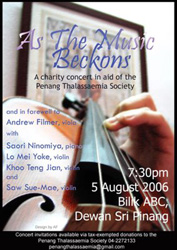More than one would think.
A decade or so ago when the whole Anwar Ibrahim political upheaval created a new political party, the choice of name was rather important, and it was no surprise when there was a legal battle on whether the People's Justice Party could shorten its name to just Justice. I mean, imagine, you're either for Justice or you're not.
The only problem is that it only works when it's a novelty and when people quite frankly don't know anything about you, and this symbolism fills a nice empty hole. Think about it - in the United States one doesn't really think of one as being more democratic or more republican in the sense of whether one prefers democracy or the republic. Partially because at one point in time the two meant about the same thing, since power to the people meant taking it from the King. When that symbolism is gone, there come far more pressing matters. Like whether you prefer donkeys or elephants.
Sometimes there's a certain subtlety in it too. Like calling yourself Tony, when you're British and your name really is Anthony Charles Lynton Blair. Or Little John when you're about the size of Sherwood Forest. But sometimes it can backfire, especially when you're from the Republican party and a magazine calls you Emperor George W. Bush II.
There are times I don't entire get it though. Like how the idea of Uncle Sam is encouraging, but Big Brother isn't - I mean, who decided on the family hierarchy? And I'm still wondering about when Lina Joy lost her appeal to declare herself a non-Muslim, whether the people who wrote the headline "No to Joy" really knew about the double entendre.
YouTube practically runs on names, since you have to "name" your videos in ways that would make it easy for people to search. How reassuring then, that the most popular video for the name "Malaysia" is one offering proof of Bigfoot.
Symbolism is central to our culture today. Take linguistics, a field of study which could be studied from, I daresay, a simple and practical perspective, owing which scores of second-language English users could feel a sense of social unity by being just as clueless as native speakers when it comes to using the word "whom". (The benefit would be that no one would feel guilty about it).
The problem with that is that it would be far too useful to be considered a proper academic area and poor linguists would be out on the streets, eventually losing their minds, and begging on sidewalks while correcting the grammar of passers-by.
To avoid this, the field of linguistics produces complicated lingo to create a symbolism of grandeur. Like a "voiceless labiodental fricative".
Don't tell anybody, but between you and me, that's really just the sound "f". Imagine the words you wouldn't be able to make without your voiceless labiodental fricatives. When you're done swearing, let's get back to reading my blog.
Yes, a name carries a big significance. And so when BBC News announces that Anwar Ibrahim's case of defamation against former Prime Minister Dr Mahathir Mohamed was thrown out, there are a few things to think about. First, which of these is worse: when someone considered intelligent can go about saying, "Imagine having a gay prime minister. Nobody would be safe"... or when someone else, also considered intelligent considers that not, say, slander, but defamation of character.
Second, and far more important when one chooses sides in the never-ending Anwar versus Mahathir bruhawhaw: are you strong enough for war, or do you like hats?
Wednesday, July 04, 2007
Subscribe to:
Post Comments (Atom)






No comments:
Post a Comment